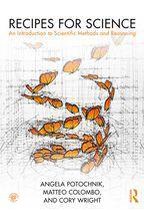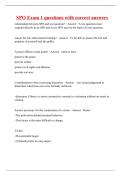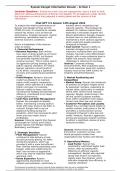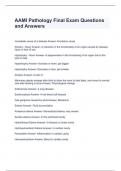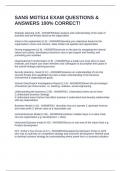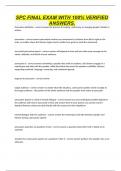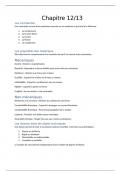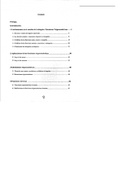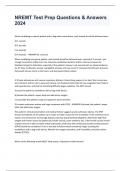Recipes for science
Chapter 1. What is science?
1.1 The importance of science
The role of science
● Understanding how scientists acquire new knowledge, the basis for science;s
authority as a source of knowledge, and the limits of that authority gives us
us greater reason to trust scientific knowledge → consider the nature of
expertise
○ Illusion of understanding: a lack of genuine understanding of some topic is
linked to a lack of appreciation for the depth of one’s ignorance about the topic
○ Improving literacy → important for informed public engagement
● Understanding the processes that give rise to trustworthy scientific knowledge is
important in deciding what to believe, who to believe and how to learn more
What science is good for
● Science’s role in satisfying our practical goals (computers, medication, airplanes)
● Science aims at the production of knowledge, requiring at least 3 elements:
○ Belief: in the subjects
○ Justification: reasons to believe something
○ Truth: the subject must be true
● Science is our best route to knowledge about the world
○ Scientific knowledge usually has practical benefits and can influence how we act
● Basic research: scientific research aiming knowledge for its own sake
○ Aim: explanatory knowledge: knowing how things work and why things are the
way they are
● Applied research: exploit knowledge to develop some product
Science’s limitations
● Scientists try to gain knowledge about phenomena: appearances of things occurring in
the world
● Science does not replace/limit non-scientific intellectual pursuits (literature, philosophy)
● Scientific knowledge differs from religion and theological doctrine
,1.2 Defining science
The tricky work of defining science
● Nature of science divided into 2 parts
○ What’s distinctive+important abt science when it comes to generating knowledge
○ Where we ought to draw lines between science and non-science
● Science has earned authority + legitimacy from centuries of successes & improvements
● Pseudosciences: false/fake science (e.g. astrology, creationism/intelligent design, conversion therapy,
homeopathy) → Tests of theories have proven utter failure to predict/explain
● It’s not simple to find the essential difference between science and non-science
● Variety in science (physical science, life science, social science) may make it
impossible to give a neat and exceptionless definition of science → how to
define?
○ Choose distinctive ingredients of science as a guide
Defining science by its history
● Science, from its origins, has been about the pursuit of knowledge (Latin)
● Persian Golden Age → hindu-arabic numeral system (base of current system),
medicine innovation, vision work, nature theories
● Scientific revolution → important to the origination of modern science( heliocentric
cosmos, development of chemistry, biology, psychology)
○ Fundamental transformations in out knowledge
● When defining science straightforwardly by its history, it’s unclear whether and how
some of today’s scientific disciplines relate to the scientific revolution
● Look at developed science methods? → altered a lot as well
Defining science by its subject matter
● Big variety of subjects, a list would not define science
● Search for what the topics have in common: the aim of science is providing natural
explanations of natural phenomena
○ Natural phenomena: objects, events, regularities, processes that are sufficiently
uniform to make then susceptible to systematic study
○ Phenomenon that which appears, is seen or otherwise experiences →
observable occurrences
○ Observable: detectable with the huse of our senses (incl. aid by technology)
○ Natural explanations: observable features of the world to account for natural
phenomena
○ Supernatural: not governed by natural law, and may not be observable
(ghosts) → not relevant for science and the contrary of natural
● Pursuit of natural explanations for natural phenomena doesn’t necessarily demarcate
science from non-science (football coaching can be explained but is not a science)
,Defining science by its methods
● One distinctive ingredient: science involves empirical investigation using one’s sense,
but that is not enough as it is part of the human condition, not distinctive to science
● Evidentialism: a belief’s justification is determined by how well the belief is supported
by evidence
○ Together with empirical investigation → scientific beliefs should be
supported by empirical evidence
● Much of the empirical evidence supporting your beliefs does not come
directly from your own sensory experience → other people reporting on their
experience
○ Scientists leave open the possibility their ideas are mistaken
● Falsificationism: scientific reasoning proceeds by attempting to disprove ideas
rather than to prove them right → controversial:
○ Complex relationship empirical evidence <> scientific theory → when
does the evidence disprove an idea?
○ Limit scientific process when trying to prove ideas wrong over and over again
○ 2 key elements of falsificationism accurately describe scientific reasoning:;
■ Any scientific claim should be falsifiable: one should be able to describe
what kind of empirical evidence would show the claim is wrong
■ Openness to falsification: honesty when evidence goes against a
theory
● Qualitative analysis:using mathematical techniques to measure/investigate natural phenomena
● Distinct science by its social & institutional structure: collaboration / competing to be 1st
The nature of science
● Distinctive features of science until now: aiming to generate knowledge, a basis in the
scientific revolution, naturalism, empirical investigation, evidentialism, falsifiability,
openness to falsification, using mathematics, social structure as ingredients of science
● Science is now characterized as an inclusive social project of developing natural
explanations of natural phenomena. These explanations are evaluated in the light of
empirical evidence, and should be subject to additional open criticism, testing,
refinement, or even rejection. Science regularly (not always) employs mathematics in
both the formulations and evaluation of its explanations
● Examples of pseudosciences: astrology, denial of climate change, anti-vax advocacy,
intelligent design (=an intelligent creator is responsible for life on earth)
checklist for evaluating whether an idea or project qualifies as scientific
✓ Aims to provide natural explanations of natural phenomena ( naturalism)
✓ Puts forward ideas that can be tested with empirical evidence ( empirical investigation,
falsifiability)
✓ Updates ideas based on available evidence (Evidentialism)
✓ Would abandon any idea that was thoroughly refuted ( openness to falsification)
✓ Employs mathematical tools appropriately when they are useful ( mathematics
techniques)
, ✓ Involves the broader scientific community (social and institutional structure)
1.3 Recipes for science
The scientific method is a myth
● No simple method in what makes science good at producing trustworthy knowledge
● No method or scientific discovery
● Many differences in how and the degree to which scientific claims are tested by
empirical evidence
The flaws in human reasoning
● Humans have flaws in how we gather evidence and how we reason → science
is a valuable route to knowledge about the world as it has ways to protect us
from the flaws
● Confirmation bias, the tendence we all have to look for, interpret, recall evidence in
ways that confirm and do not challenge our existing beliefs
● Observer-expectancy effect: a scientist’s expectations lead to unconsciously
influencing the behaviour of experimental subjects
Norms of investigators (individual)
● 2 categories of features of why science can counteract basic flaws in human reasoning
○ Norms of science that apply to individual scientists
○ Norms of science that apply to the scientific community
● Scientists are obligated to have a certain kind of integrity → scientific
integrity
○ Requires sincerity, honesty, avoidance of improper influence by others
● Plagiarism:presenting someone else’s ideas, scientific results, words as owns work,
intentionally or unintentionally, by not giving proper credits (violation of scientific integrity)
● Another violation of scientific integrity: faking data to support a desired conclusion
● Avoid conflicts of interests: financial or personal gains that may inappropriately
influence scientific research, results, or publications
● Promote scientific integrity by houlding scientists accountable for their work, scientists
should be open to criticisms of their work and to new ideas, ingenuity
Social norms (community)
● Scientific research is collaborative and relies on past works (different fields),
critical evaluation → norms for the community
● Replication: an experiment or study is carried out again in order to see
whether the same results are achieved → double confirmation or doubts
raised → skepticism
Chapter 1. What is science?
1.1 The importance of science
The role of science
● Understanding how scientists acquire new knowledge, the basis for science;s
authority as a source of knowledge, and the limits of that authority gives us
us greater reason to trust scientific knowledge → consider the nature of
expertise
○ Illusion of understanding: a lack of genuine understanding of some topic is
linked to a lack of appreciation for the depth of one’s ignorance about the topic
○ Improving literacy → important for informed public engagement
● Understanding the processes that give rise to trustworthy scientific knowledge is
important in deciding what to believe, who to believe and how to learn more
What science is good for
● Science’s role in satisfying our practical goals (computers, medication, airplanes)
● Science aims at the production of knowledge, requiring at least 3 elements:
○ Belief: in the subjects
○ Justification: reasons to believe something
○ Truth: the subject must be true
● Science is our best route to knowledge about the world
○ Scientific knowledge usually has practical benefits and can influence how we act
● Basic research: scientific research aiming knowledge for its own sake
○ Aim: explanatory knowledge: knowing how things work and why things are the
way they are
● Applied research: exploit knowledge to develop some product
Science’s limitations
● Scientists try to gain knowledge about phenomena: appearances of things occurring in
the world
● Science does not replace/limit non-scientific intellectual pursuits (literature, philosophy)
● Scientific knowledge differs from religion and theological doctrine
,1.2 Defining science
The tricky work of defining science
● Nature of science divided into 2 parts
○ What’s distinctive+important abt science when it comes to generating knowledge
○ Where we ought to draw lines between science and non-science
● Science has earned authority + legitimacy from centuries of successes & improvements
● Pseudosciences: false/fake science (e.g. astrology, creationism/intelligent design, conversion therapy,
homeopathy) → Tests of theories have proven utter failure to predict/explain
● It’s not simple to find the essential difference between science and non-science
● Variety in science (physical science, life science, social science) may make it
impossible to give a neat and exceptionless definition of science → how to
define?
○ Choose distinctive ingredients of science as a guide
Defining science by its history
● Science, from its origins, has been about the pursuit of knowledge (Latin)
● Persian Golden Age → hindu-arabic numeral system (base of current system),
medicine innovation, vision work, nature theories
● Scientific revolution → important to the origination of modern science( heliocentric
cosmos, development of chemistry, biology, psychology)
○ Fundamental transformations in out knowledge
● When defining science straightforwardly by its history, it’s unclear whether and how
some of today’s scientific disciplines relate to the scientific revolution
● Look at developed science methods? → altered a lot as well
Defining science by its subject matter
● Big variety of subjects, a list would not define science
● Search for what the topics have in common: the aim of science is providing natural
explanations of natural phenomena
○ Natural phenomena: objects, events, regularities, processes that are sufficiently
uniform to make then susceptible to systematic study
○ Phenomenon that which appears, is seen or otherwise experiences →
observable occurrences
○ Observable: detectable with the huse of our senses (incl. aid by technology)
○ Natural explanations: observable features of the world to account for natural
phenomena
○ Supernatural: not governed by natural law, and may not be observable
(ghosts) → not relevant for science and the contrary of natural
● Pursuit of natural explanations for natural phenomena doesn’t necessarily demarcate
science from non-science (football coaching can be explained but is not a science)
,Defining science by its methods
● One distinctive ingredient: science involves empirical investigation using one’s sense,
but that is not enough as it is part of the human condition, not distinctive to science
● Evidentialism: a belief’s justification is determined by how well the belief is supported
by evidence
○ Together with empirical investigation → scientific beliefs should be
supported by empirical evidence
● Much of the empirical evidence supporting your beliefs does not come
directly from your own sensory experience → other people reporting on their
experience
○ Scientists leave open the possibility their ideas are mistaken
● Falsificationism: scientific reasoning proceeds by attempting to disprove ideas
rather than to prove them right → controversial:
○ Complex relationship empirical evidence <> scientific theory → when
does the evidence disprove an idea?
○ Limit scientific process when trying to prove ideas wrong over and over again
○ 2 key elements of falsificationism accurately describe scientific reasoning:;
■ Any scientific claim should be falsifiable: one should be able to describe
what kind of empirical evidence would show the claim is wrong
■ Openness to falsification: honesty when evidence goes against a
theory
● Qualitative analysis:using mathematical techniques to measure/investigate natural phenomena
● Distinct science by its social & institutional structure: collaboration / competing to be 1st
The nature of science
● Distinctive features of science until now: aiming to generate knowledge, a basis in the
scientific revolution, naturalism, empirical investigation, evidentialism, falsifiability,
openness to falsification, using mathematics, social structure as ingredients of science
● Science is now characterized as an inclusive social project of developing natural
explanations of natural phenomena. These explanations are evaluated in the light of
empirical evidence, and should be subject to additional open criticism, testing,
refinement, or even rejection. Science regularly (not always) employs mathematics in
both the formulations and evaluation of its explanations
● Examples of pseudosciences: astrology, denial of climate change, anti-vax advocacy,
intelligent design (=an intelligent creator is responsible for life on earth)
checklist for evaluating whether an idea or project qualifies as scientific
✓ Aims to provide natural explanations of natural phenomena ( naturalism)
✓ Puts forward ideas that can be tested with empirical evidence ( empirical investigation,
falsifiability)
✓ Updates ideas based on available evidence (Evidentialism)
✓ Would abandon any idea that was thoroughly refuted ( openness to falsification)
✓ Employs mathematical tools appropriately when they are useful ( mathematics
techniques)
, ✓ Involves the broader scientific community (social and institutional structure)
1.3 Recipes for science
The scientific method is a myth
● No simple method in what makes science good at producing trustworthy knowledge
● No method or scientific discovery
● Many differences in how and the degree to which scientific claims are tested by
empirical evidence
The flaws in human reasoning
● Humans have flaws in how we gather evidence and how we reason → science
is a valuable route to knowledge about the world as it has ways to protect us
from the flaws
● Confirmation bias, the tendence we all have to look for, interpret, recall evidence in
ways that confirm and do not challenge our existing beliefs
● Observer-expectancy effect: a scientist’s expectations lead to unconsciously
influencing the behaviour of experimental subjects
Norms of investigators (individual)
● 2 categories of features of why science can counteract basic flaws in human reasoning
○ Norms of science that apply to individual scientists
○ Norms of science that apply to the scientific community
● Scientists are obligated to have a certain kind of integrity → scientific
integrity
○ Requires sincerity, honesty, avoidance of improper influence by others
● Plagiarism:presenting someone else’s ideas, scientific results, words as owns work,
intentionally or unintentionally, by not giving proper credits (violation of scientific integrity)
● Another violation of scientific integrity: faking data to support a desired conclusion
● Avoid conflicts of interests: financial or personal gains that may inappropriately
influence scientific research, results, or publications
● Promote scientific integrity by houlding scientists accountable for their work, scientists
should be open to criticisms of their work and to new ideas, ingenuity
Social norms (community)
● Scientific research is collaborative and relies on past works (different fields),
critical evaluation → norms for the community
● Replication: an experiment or study is carried out again in order to see
whether the same results are achieved → double confirmation or doubts
raised → skepticism

